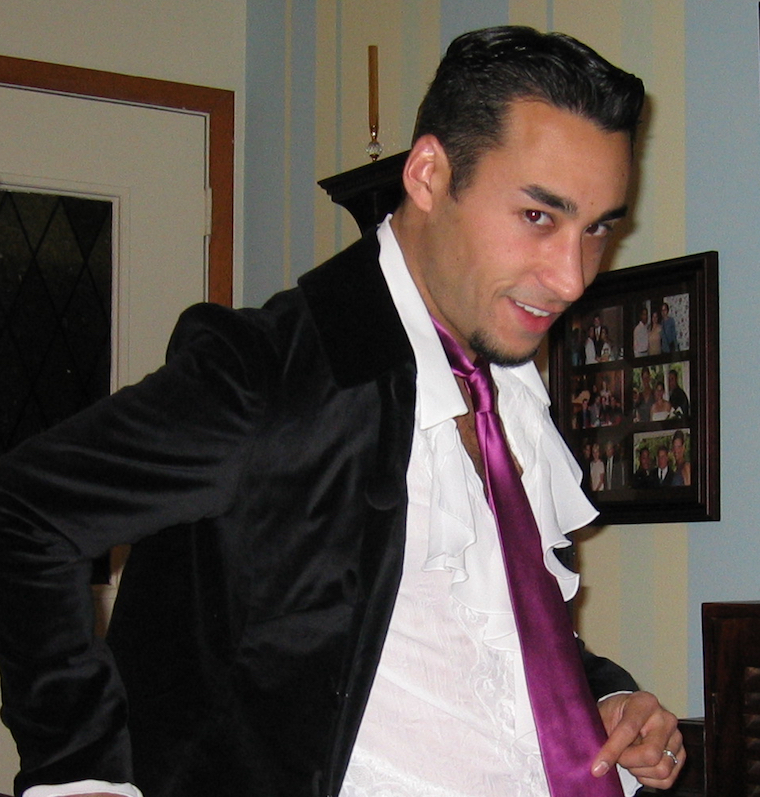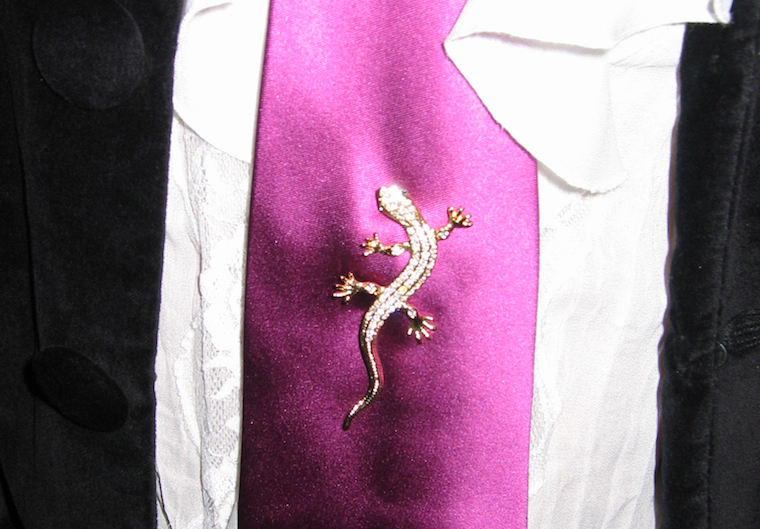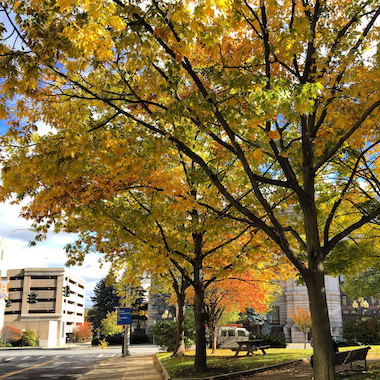“No work is insignificant. All labor that uplifts humanity has dignity and importance and should be undertaken with painstaking excellence.” – Martin Luther King Jr.
November 2004: It was the evening of the Beaujolais Nouveau Wine Celebration that benefited what was then the AIDS Council of New York (now the Alliance for Positive Health). Andy and I had been attending this event religiously since the days when it was first held at the Franklin Plaza in Troy, which is where it was on that fateful evening. I paired a jacket of black velvet and a frilly white shirt with faded jeans, then slipped on a fuchsia silk tie and pinned a chameleon made of crystals in the middle of it. This was a casual year for me. (I used to alternate between fancy and casual for this event, and the casual years were always more fun, and way more comfortable.) At such ease, I flitted about the party, talking to various people I’d come to know over the years. After half a decade in Albany, one gets to know many of its denizens. This is a small town.
Giddy off the martinis and the kick-off to the holiday season, I was talking to Jim again – who was fittingly one of the first people to coax me into a state career – when he mentioned that his friend Marline worked in Personnel at the Department of Environmental Conservation and I should talk to her about any possible jobs. I was at a party and didn’t really care to discuss work, but Jim was a good person who surrounded himself with good friends, so when he pointed her out to me I marched right over and plopped down in the seat next to her, introducing myself. She seemed a little taken aback, as most people do when I’m feeling bold enough to make such an introduction, then settled in with her glass of wine and we talked as if we’d known each other for years. I didn’t think much of it until a few months later when she was looking to fill a Secretary 1 position at her agency.
It was early spring of 2005. I’d just taken the Professional Careers Test for ‘professional’ level positions if you had a bachelor’s degree, and I’d scored 100 – a necessity to be canvassed, since so many people took that test. It was the first chance I’d had to take an exam for a Grade 18 position, and I was just beginning to get canvass letters back. I also understood the grinding halts that often accompanied advancing in a state career, so I remained on the look-out for a promotion, and when a Secretary 1 position opened up, I applied for a transfer.
It was not directly in her office, it was for the Office of Affirmative Action, and it would entail working with a supervisor who was, as Marline put it, someone I was either going to love or hate. Shrugging off those fateful words, I scheduled an interview, for practice and possibility, as I had just turned down an offer as a Budget Analyst – Grade 18 – at a different agency based on the frightening stories of tax season and all that would be required of me. (It wasn’t so much the hours and stress that scared me away, but the idea of doing budget work. That’s not in my wheelhouse.) But Affirmative Action was something I could do. At least, I thought it was.
[Today the term Affirmative Action is rife with conflicted interpretation and controversy, but when you understand and hear the history of why we have it (which is not a lesson I’m going to impart right now) you have a greater appreciation for it. I had an excellent Social Studies teacher in 11thgrade who impelled its importance on a level that was simple, powerful, and stays with me to this day. Now we have terms such as Diversity and Inclusion to more accurately reflect the changing role of its function.]
Far more than doing something meaningful, however, was the chance for a promotion, and once again I was contemplating a move to another agency to make that happen.
I drove downtown on a sunny day in April. The leaves had just started coming out in bright shades of chartreuse and lime, and I parked across the street from the DEC building. I remembered this area from my first job at the Department of State. It felt so long ago, but in reality it had only been a few years. I was back in downtown Albany and something felt right.
Marline met me in the lobby then brought us up to the 10thfloor. We went into an enclave and waited for the man who would be my supervisor to join us. Juan burst in and proceeded to regale us with colorful tales of his life in coarse, familiar language. He was a character to be sure, but one whom I could enjoy. In many respects he reminded me of my crazy, and favorite, Uncle. Marline was a little hesitant, unsure whether I would be able to handle or put up with him, I couldn’t tell which, but I already knew I could work with Juan, and a few weeks later they offered me the job.
As Juan’s Secretary 1, I watched, studied, and figured out the best ways to handle the responsibilities of the position. Guided mainly by Marline, I learned the job duties, but mostly I learned how to deal with one of the most complex, challenging, and at times infuriating characters to cross my state path. His one saving grace, that forgave a lot of personal issues, was that he truly cared about his job, about ensuring that every single person was afforded an opportunity to excel at their employment, and that we all had an equal chance for that. He fought for such above all else, and there was, and is, a nobility and honor in that which nothing else can touch. Oddly enough, I got on quite well with him, partly because I wouldn’t tolerate his nonsense and antics, and up until the end I’d like to think that we carefully guarded a mutual sense of respect and admiration for each other.
Juan taught me many things – more often than not it was about what I didn’t want to be, but there’s a valuable lesson in that too. I kept my head down and did the best job I could, and a few weeks into the job, someone found out I was on the Professional Careers list and proposed putting me into a Senior Personnel Administrator traineeship – which would lead to a grade 18 Senior Personnel Administrator position. I’d still be working with Juan, but gradually shift into more Human Resources-oriented work.
The summer of 2005 was big for me. I’d just turned 30 years old, I’d been promoted to a ‘professional’ position, and I was at an agency I not only enjoyed, but of which I could be proud. (You don’t usually find that kind of pride at Tax and Finance.) I would stay at DEC for almost ten years – longer than all my other state jobs put together. If I had to consider a single agency as my home, the Department of Environmental Conservation would be it. Along with Marline, I made a number of other good friends who became much more than co-workers: Sherri, Lorie, Sue, Doris – and I genuinely enjoyed the company of every single person in our Personnel office. That kind of situation is rare, and I felt extremely lucky to have found such a home. There’s just one thing about being home: sooner or later most of us have to leave at some point… even when you’re almost 40.
As the seasons and the years passed, other people around me advanced and got promoted, and while I was doing all that was asked of me, I became complacent and perhaps too comfortable. It was difficult to find things to do that would set me apart and justify a promotion. I had been at DEC for many years, and the thought left me feeling accomplished, but also somewhat unfinished. A change was in the air – it felt like fall in a certain way – and I watched the shift of afternoon light, the tilt of the sun, and the fiery leaves of the trees. Once again, it was time to move on…
“For what it’s worth: it’s never too late to be whoever you want to be. I hope you live a life you’re proud of, and if you find you’re not, I hope you have the strength to start over again.” – F. Scott Fitzgerald
{See Part One, Part Two and Part Three.}
Back to Blog






